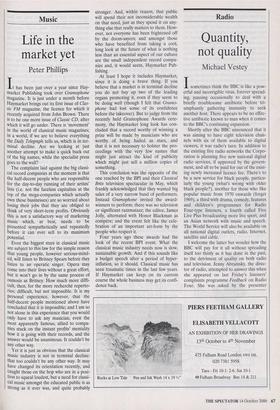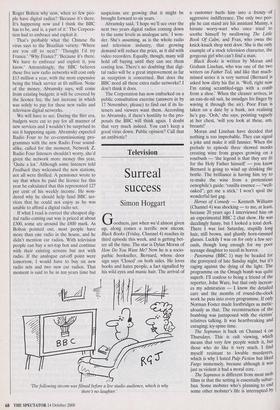Radio
Quantity, not quality
Michael Vestey
Isometimes think the BBC is like a pow- erful and incorrigible virus, forever spread- ing, pausing occasionally to deal with a briefly troublesome antibiotic before tri- umphantly gathering immunity to seek another host. There appears to be no effec- tive antibiotic known to man when it comes to the BBC's continuing expansion.
Shortly after the BBC announced that it was aiming to have eight television chan- nels with six of them available to digital viewers, it was radio's turn. In addition to the existing five radio networks the Corpo- ration is planning five new national digital radio services, if approved by the govern- ment, and all to be paid for out of the exist- ing newly increased licence fee. There's to be a new service for black people, particu- larly the young (what's wrong with older black people?), another for those who like popular music from 1970 onwards (forget 1969), a third with drama, comedy, features and children's programmes for Radio Four-type listeners, a fourth called Five Live Plus broadcasting more live sport, and an Asian network with music and speech. The World Service will also be available on all national digital outlets, radio, Internet, satellite and cable.
I welcome the latter but wonder how the BBC will pay for it all without spreading itself too thinly as it has done in the past, to the detriment of quality on both radio and television. Jenny Abramsky, the direc- tor of radio, attempted to answer this when she appeared on last Friday's listeners' complaints programme Feedback on Radio Four. She was asked by the presenter Roger Bolton why now, when so few peo- ple have digital radios? 'Because it's there. It's happening now and I think the BBC has to be, and is, a part of it.' The Corpora- tion had to embrace and exploit it.
That's probably what the Chinese flu virus says to the Brazilian variety: 'Where are you off to next?' Thought I'd try France.' Why France?' Because it's there. We have to embrace and exploit it, you know.' Astonishingly, the BBC believes these five new radio networks will cost only £13 million a year, with the most expensive being the black service at £6 million. None of the money, Abramsky says, will come from existing budgets; it will be covered by the licence fee, the last increase in which was solely to pay for these new radio and television digital networks.
We will have to see. During the Birt era, budgets were cut to pay for all manner of new services and I wouldn't be surprised to see it happening again. Abramsky expected Radio Four to be co-commissioning pro- grammes with the new Radio Four sound- alike, called for the moment, Network Z. Radio Four listeners shouldn't worry, she'd given the network more money this year, `Quite a lot.' Although some listeners told Feedback they welcomed the new stations, not all were thrilled. A pensioner wrote to say that when he paid the licence fee this year he calculated that this represented 127 per cent of his weekly income. He won- dered why he should help fund BBC ser- vices that he could not enjoy as he was unable to afford a digital radio set.
If what I read is correct the cheapest dig- ital radio coming our way is priced at about £300, some are around the £800 mark. As Bolton pointed out, most people have more than one radio in the house, and he didn't mention car radios. With television people can buy a set-top box and continue with their existing screens but not with radio. If the analogue cut-off point were tomorrow, I would have to buy six new radio sets and two new car radios. That moment is said to be in ten years time but suspicions are growing that it might be brought forward to six years.
Abramsky said, 'I hope we'll see over the next two years digital radios coming down to the same levels as analogue sets.' I won- der. She's assuming, as is the whole radio and television industry, that growing demand will reduce the price, as it did with video recorders. Equally, though, many will hold off buying until they can see them costing less. There's no doubting that digi- tal radio will be a great improvement as far as reception is concerned. But does the BBC need all these extra radio networks? I don't think it does.
The Corporation has now embarked on a public consultation exercise (answers in by 17 November, please) to find out if its lis- teners and viewers want them. According to Abramsky, if there's hostility to the pro- posals the BBC will think again. I doubt that very much indeed. You can't keep a good virus down. Public opinion? Call that an antibiotic?



















































































 Previous page
Previous page